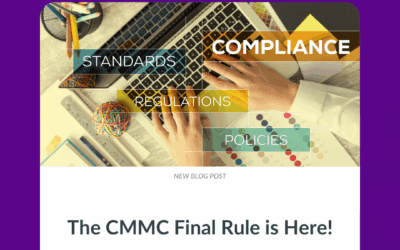Welcome to the world of defense contracting, where the stakes are high, the competition is fierce, and the regulations are complex. One such regulation that significantly shapes this landscape is the Defense Federal Acquisition Regulation Supplement, or DFARS, particularly clause 252.204. This clause, like a meticulously crafted blueprint, outlines stringent measures to protect sensitive defense information, or Controlled Unclassified Information (CUI) from cyber threats. In this comprehensive guide, we will help you navigate through the intricate maze of DFARS 252.204. We’ll delve into its purpose, highlight its key requirements, discuss the challenges and benefits of compliance, and much more. So, buckle up, and let’s get started!
What is DFARS 252.204?
Stepping into the core of DFARS 252.204, we discover that its purpose carries two essential elements working together to accomplish a critical mission.
Establishing standards & protecting sensitive information
The first part is to shield sensitive information from the rising wave of cyber threats. In an era where cyber-attacks have become increasingly sophisticated, safeguarding sensitive defense information is more crucial than ever. DFARS 252.204 requires defense contractors to implement robust cybersecurity measures, following the guidelines outlined in the National Institute of Standards and Technology’s (NIST) Special Publication 800-171. By doing so, defense contractors create a fortified digital fortress, keeping critical data safe from nefarious cyber actors who might exploit this information to the detriment of national security.
Reporting cyber incidents
The second facet of DFARS 252.204’s purpose is to establish a standardized procedure for reporting cyber incidents. Much like a lighthouse guiding ships through a stormy night, these reporting procedures provide a clear path for defense contractors to follow when a cyber incident occurs.
Together, these dual objectives of protecting sensitive information and establishing standardized reporting procedures form the essence of DFARS 252.204, creating a more secure and responsive defense contracting environment.
The many clauses of DFARS 252.204
DFARS 252.204 contains 25 clauses that essentially break down into the need to adhere to a robust cybersecurity standard, what is required for reporting incidents, and developing and maintaining a System Security Plan. The clauses are as follows:
252.204-7000 Disclosure of Information: This clause dictates that the contractor is not allowed to release any unclassified information about their contract without prior written approval from the DoD.
252.204-7001 Reserved: This clause was reserved for future use.
252.204-7002 Payment for Contract Line or Subline Items Not Separately Priced: Contractors are not allowed to invoice for items that have not been priced unless they are approved by the Contracting Officer.
252.204-7003 Control of Government Personnel Work Product: This clause states that any work product generated by government employees during contract performance is the exclusive property of the U.S. Government.
252.204-7004 Antiterrorism Awareness Training for Contractors: Requires contractors to complete Level I antiterrorism awareness training within 30 days of contract award and annually thereafter.
252.204-7005 Reserved: This clause was reserved for future use.
252.204-7006 Billing Instructions: This clause provides detailed instructions for contractors on how to prepare and submit invoices and/or vouchers.
252.204-7007 – Alternate A, Annual Representations and Certifications
252.204-7008 – Compliance with Safeguarding Covered Defense Information Controls
252.204-7009 – Limitations on the Use or Disclosure of Third-Party Contractor-Reported Cyber Incident Information
252.204-7010 – Requirement for Contractor to Notify DoD if the Contractor’s Activities are Subject to Reporting Under the U.S.-International Atomic Energy Agency Additional Protocol
252.204-7011 Reserved: This clause was reserved for future use.
252.204-7012 – Safeguarding Covered Defense Information and Cyber Incident Reporting
252.204-7013 Reserved: This clause was reserved for future use.
252.204-7014 – Limitations on the Use or Disclosure of Information by Litigation Support Contractors
252.204-7015 – Notice of Authorized Disclosure of Information for Litigation Support
252.204-7016 – Covered Defense Telecommunications Equipment or Services—Representation
252.204-7017 – Prohibition on the Acquisition of Covered Defense Telecommunications Equipment or Services—Representation
252.204-7018 – Prohibition on the Acquisition of Covered Defense Telecommunications Equipment or Services
252.204-7019 – Notice of NIST SP 800-171 DoD Assessment Requirements
252.204-7020 – NIST SP 800-171 DoD Assessment Requirements
252.204-7021 – Cybersecurity Maturity Model Certification Requirements
252.204-7022 – Expediting Contract Closeout
252.204-7023 – Reporting Requirements for Contracted Services
252.204-7024 – Notice on the Use of the Supplier Performance Risk System
Breaking down DFARS 252.204-7012 requirements
Through the lens of DFARS 252.204-7012, defense contractors are not just entities performing a service or supplying a product; they become custodians of sensitive information, tasked with protecting the digital frontier of national security. Therefore, a deep understanding of DFARS 252.204-7012 is not just a regulatory necessity but a cornerstone of a responsible and reliable defense contractor’s ethos. Here, we break down what’s required of defense contractors for a comprehensive understanding to lead to compliance success.
Implement NIST SP 800-171: The DFARS 252.204-7012 clause is about establishing NIST 800-171 as the cybersecurity standard for protection CUI across the entire Defense Industrial Base (DIB), so naturally implementing these controls is going to be a crucial step in getting compliant.
System Security Plan (SSP) and Plan of Actions & Milestones (POAM or POA&M): Defense contractors must develop an SSP that outlines how they are implementing or planning to implement the NIST SP 800-171 controls. Furthermore, if a contractor isn’t meeting all the requirements, they must develop a POA&M to document when and how any unimplemented security requirements will be met, how any planned improvements to the existing security will be accomplished, and how and when they will correct deficiencies and reduce or eliminate vulnerabilities in the systems.
Cyber Incident Reporting: In the event of a cyber incident, defense contractors must conduct a review for evidence of compromise of CUI, identify the compromised data, and report the incident to the Department of Defense (DoD) within 72 hours. This prompt reporting allows the DoD to quickly respond to the incident, mitigating potential damage and preventing further security breaches.
Damage Assessment: If a cyber incident occurs, contractors must further support the DoD’s damage assessment. They are also required to preserve and protect images of affected systems and all relevant monitoring/packet capture data for at least 90 days to allow DoD to request the information.
Flow Down to Subcontractors: When subcontractors are involved, the clause must be flowed down in subcontracts or similar contractual instruments. It applies to all tiers of subcontractors that may come into contact with CUI or are required to conduct operationally critical support.
Cloud Computing: If a contractor intends to use an external cloud service to store, process, or transmit any CUI, the cloud service must meet security requirements equivalent to those established by the Government for the Federal Risk and Authorization Management Program (FedRAMP) Moderate baseline.
What is DFARS 252.204-7019?
DFARS 252.204-7019 is designed to ensure the proper implementation of the security controls in NIST SP 800-171 by introducing an assessment of a contractor’s SSP and NIST SP 800-171 controls. Let’s dive in a little deeper.
NIST SP 800-171 DoD Assessment: Defense contractors are required to have a current (i.e., not older than three years) NIST SP 800-171 DoD Assessment for each covered contractor information system that is relevant to the offer, contract, task order, or delivery order.
Three Levels of Assessment: The clause outlines three levels of assessments varying in thoroughness and rigor. Level 1, Basic Assessment, is a self-assessment done by the contractor. Level 2, Medium Assessment, involves a review of the contractor’s Basic Assessment by the DoD. Level 3, High Assessment, is an in-depth assessment conducted by the DoD on the contractor’s premises.
Supplier Performance Risk System (SPRS): Defense contractors are required to submit assessment scores to the SPRS, the DoD’s platform for collecting and managing supplier and product performance information. The SPRS score reflects the extent to which the contractor has implemented the NIST SP 800-171 controls.
Assessment Documentation: Defense contractors must keep detailed records of their assessments. This includes the SSP and any POAMS you’ve created. These documents must be available to the DoD upon request.
Flow-Down Requirement: Just like clause DFARS 252.204-7012, the DFARS 252.204-7019 clause must also be flowed down to all subcontractors or suppliers where their work statement involves CUI or operationally critical support.
What is DFARS 252.204-7020?
DFARS 252.204-7020 establishes the assessment methodology for evaluating the implementation of NIST SP 800-171 controls.
Requirement for an Assessment: This clause like its 7012 and 7019 counterparts, makes it mandatory for defense contractors to maintain a current (not older than three years) NIST SP 800-171 DoD Assessment.
Access to Facilities and Systems: Defense contractors are required to provide the DoD, or its designated representatives, access to their facilities, systems, and personnel when a Medium or High NIST SP 800-171 DoD Assessment is required. This allows the DoD to verify that the contractor is effectively implementing the security controls specified in NIST SP 800-171.
Protection of Information: Information collected during the assessment process will be protected by the DoD as CUI.
Level of Assessments: The clause also details the three levels of assessments (Basic, Medium, and High).
Reassessment after Remediation: After the contractor corrects deficiencies identified during the assessment, they may request a reassessment to update the score in SPRS).
Flow Down to Subcontractors: This clause must be incorporated in subcontracts or similar contractual instruments that involve the contractor or subcontractor performing operationally critical support or where it will have CUI residing in or transiting through its information system.
What is DFARS 252.204-7021? - Introducing CMMC
DFARS 252.204-7021 adds an additional layer of cybersecurity compliance for defense contractors. The clause introduces the Cybersecurity Maturity Model Certification (CMMC), a framework that measures a contractor’s cybersecurity maturity across a set of defined capabilities and processes. Let’s break it down a bit further.
Requirement for CMMC: DFARS 252.204-7021 mandates that contractors achieve a certain CMMC level, depending on the nature of the contract. The CMMC level required will be specified in the Request for Proposals (RFP) and will ultimately be included in the contract.
CMMC Levels: The CMMC framework comprises three maturity levels ranging from Level 1 (Foundational) to Level 3 (Expert). Each level corresponds to an increasing degree of cybersecurity sophistication and operational resilience.
CMMC Certification: Contractors are required to achieve the appropriate CMMC certification from an accredited CMMC Third Party Assessment Organization (C3PAO) before contract award. The certification must cover all the information systems that will be used to fulfill the contract.
Maintaining Certification: The contractor must maintain the required CMMC level for the duration of the contract. Additionally, they must ensure their certification remains valid (certifications are valid for three years).
Subcontractor Requirement: The clause must be flowed down to all subcontractors at any tier. The appropriate CMMC level for subcontractors will be defined based on the nature of the information they handle and the functions they perform.
Access to CMMC Information: DFARS 252.204-7021 authorizes the government to access the contractor’s CMMC information, including the certification level, the date of certification, and the C3PAO that conducted the certification.
What are the consequences of non-compliance for defense contractors?
Non-compliance with the stringent requirements of DFARS 252.204, like attempting to chart a course through stormy seas without a compass, can bring about an array of dangerous consequences for defense contractors. Some of which include:
Penalties: Non-compliance can lead to serious legal repercussions, such as contractual disputes, financial penalties, and civil or criminal charges. The U.S. government is firmly committed to protecting its sensitive data, and it has adopted a zero-tolerance policy towards breaches of DFARS clauses. Neglecting compliance obligations can lead to fines that can reach millions of dollars, depending on the gravity and frequency of the violations.
Loss of Contracts: DFARS compliance is a prerequisite for bidding on and retaining DoD contracts. Inability to comply with the security controls and incident reporting procedures can lead to disqualification from contract competition. Furthermore, if a contractor is found to be non-compliant during the execution of a contract, the government has the right to terminate the contract for default. This loss of business can have devastating financial consequences.
Reputational Damage: Beyond the immediate legal and financial implications, non-compliance can also lead to significant reputational damage. In the highly competitive defense industry, a company’s reputation for trustworthiness and reliability is paramount. A single instance of non-compliance, especially if it results in a security breach, can irreparably damage a contractor’s standing. The loss of trust can extend beyond the government to affect relationships with partners, suppliers, and customers, leading to long-term business implications.
Impacts on National Security: Finally, the potential impacts of non-compliance reach far beyond the contractor itself. Any compromise of sensitive defense information can have dire consequences for national security. This reinforces the importance of each contractor’s role in the wider defense ecosystem.
How can I get help with compliance?
Ready to get started? The National Institute of Standards and Technology (NIST) states that “being DFARS compliant likely involves working with a cybersecurity consultant that knows the NIST SP 800-171 requirements inside and out.” Given cybersecurity consultants’ expertise in cybersecurity best practices and understanding of the regulatory landscape, they are equipped to provide invaluable guidance and support. More specifically, we recommend working with a certified CMMC Registered Provider Organization (RPO) like Ardalyst. Ardalyst helps its customers in a few ways:
1. Compliance Assessment: Ardalyst can conduct a comprehensive audit of your current cybersecurity policies, procedures, and systems against the requirements of DFARS 252.204, specifically the 110 security controls outlined in NIST SP 800-171. This assessment helps to identify gaps and weaknesses that need to be addressed.
2. Remediation Planning: After identifying the areas that need to be improved, Ardalyst helps you build an effective remediation strategy via a comprehensive cybersecurity program. We also provide a detailed action plan to address the identified gaps and enhance cybersecurity practices.
3. Remediation & Configuration: Our cybersecurity and technical experts can put your program in place properly, configure your tools to the appropriate standards, and set your business up for success.
4. Documentation Support: Ardalyst can work with you to produce and maintain the extensive documentation required, including System Security Plans (SSP) and Plans of Action & Milestones (POAM).
5. Preparation for CMMC Assessment: An RPO can help businesses prepare for the CMMC assessment by a Certified 3rd Party Assessment Organization (C3PAO). They can conduct mock assessments, provide feedback, and help businesses understand what to expect during the actual assessment.
7. Ongoing Support: Once you’ve achieved compliance, Ardalyst can provide ongoing support to ensure that businesses maintain their compliance, including managed detection and response, periodic reviews, updates in response to regulatory changes, and continuous improvement of cybersecurity practices.
Get started!
Start your journey to compliance with a FREE trial of Tesseract, a comprehensive cybersecurity program designed to meet DFARS, NIST, and CMMC requirements, which includes:
- A Free Risk Assessment that meets the requirements for RA.L2-3.11.1 and lays the foundation for your program
- A Preview of your System Security Plan (SSP) & Plan of Actions and Milestones (POAM)
- An overview of the Tesseract Managed Cybersecurity Program and your path to getting & staying compliant
- A technical design of your Tesseract program enclave
- Exclusive deals on additional tools like Microsoft GCC & GCC-High
Frequently asked DFARS 252.204 questions
What is the relationship between FAR and DFARS?
DFARS is a supplement to FAR, providing additional rules and guidelines specifically for defense acquisitions.
Can small businesses comply with DFARS 252.204?
Yes, small businesses can comply with DFARS 252.204. However, they may face challenges such as limited resources and the complexity of the compliance process.
What constitutes a cyber incident under DFARS 252.204?
A cyber incident is defined as actions taken through the use of computer networks that result in a compromise or an actual or potentially adverse effect on an information system and/or the information residing therein.
How often should a defense contractor review their SSP?
It’s recommended to review and update the SSP at least annually, or whenever significant changes are made to the information system.
What is the difference between CUI and covered defense information (CDI)?
CUI is a broader category of information that requires safeguarding, while CDI is a subset of CUI that specifically pertains to defense-related information.
Is DFARS 252.204 a one-time compliance process?
No, maintaining DFARS 252.204 compliance is an ongoing process that involves regular reviews and updates to the SSP, continuous monitoring of cybersecurity measures, and prompt reporting of any cyber incidents.



